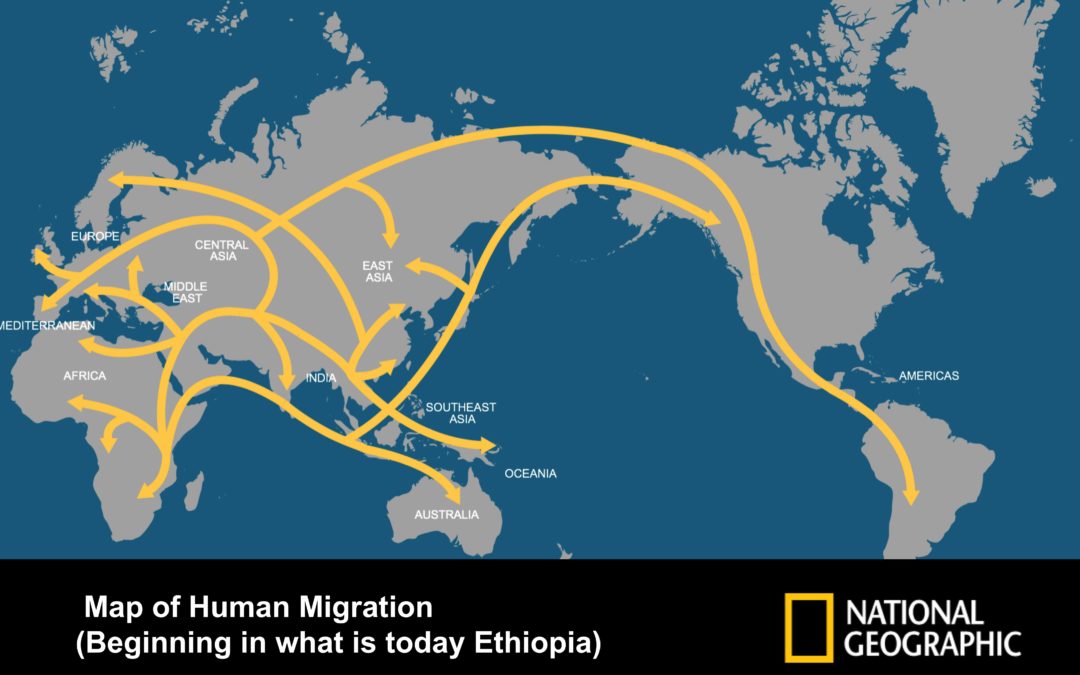The concept of “race” is, historically, a modern concept. It developed as part of 19th Century European historicist philosophy and evolutionary biology. It was a failed attempt to enshrine tribalism with the authority of modern science.
I, for one, have never bought into the idea that human beings are divided into biologically-based “races.” The science of race has always been flimsy. Check out phrenology if you doubt this. Or pick up some old books by Hegel, who was among the first to hypothesize about race.
WE’RE ALL AFRICANS
That’s why I often remark, during discussions of race, ethnicity, and related subjects, that in the final analysis—regardless what color skin you have—we’re all Africans. Fossil evidence suggests that the first homo sapiens emerged in Africa, what is modern day Ethiopia in particular, and then spread over millennia to the far reaches of the Earth.
Racism as an alleged wrong became a meaningful moral and political social construct in the United States in the period of Jim Crow, after the Civil War, leading up to the Civil Rights Movement of the 1960s.
Prior to the Civil War, the main social problem was not racism, per se, but government-sanctioned, legalized enslavement of human beings. That problem was solved in the United States at a cost of nearly 700,000 dead in one of the most destructive, blood-drenched civil conflicts in modern history. For his role in that conflict and for his effort to change government slave policy, Abraham Lincoln was provided with a bullet blasted through his brain.
Today, in the United States, the term “racism” has been watered down almost to the point of meaninglessness.
Are there citizens among us who don’t like people who look different from themselves? Yes, there are. And, without the backing of government power, there is not much, legally, that a citizen can do to someone he doesn’t like other than choose not to associate with that person.
The larger problem today, however, is that many people hurl accusations of racism not to describe someone in the grip of violent hatred toward individuals with a certain skin color, but merely to silence or discredit anyone with whom the accusers disagree.
WHEN A WORD MEANS EVERYTHING, IT MEANS NOTHING
Sometimes, those who are not politically progressive—meaning those who don’t want to use government power to regulate the lives of others or confiscate their property—are labeled “racist” simply because they’re not politically progressive, simply because they don’t want to regulate the lives of others or confiscate their property.
Often, “racist” is used as a synonym for jerk, rude, crank, grouchy, disagreeable, or weird. Find someone to be especially difficult? Call him a racist!
Race is now routinely conflated with religion, gender, differing amounts of wealth that different people have created, differences in preferences of sexual pleasures, and national origins and ethnicity. Disagree with anyone on any subject, for any reason, and it’s likely someone will accuse you of being racist.
The charge of “racism” now has almost nothing to do with “race,” which is probably fitting, given that the concept of race emerged from 19th Century European historicist philosophy and flimsy science.
Perhaps it’s time to bury the concept of “race”? Or merely ignore it? Perhaps we should leave the idea of race to the intellectual confusion of the past, where it belongs?
Perhaps, instead of judging people and instead of dividing citizens into categories within our laws and public policies based on skin color or “race,” we instead look at people as individuals, we reserve judgement until we know something about the content of a person’s character, and we remove from our laws and public policies each and every instance that categorizes citizens by skin color or “race”?

